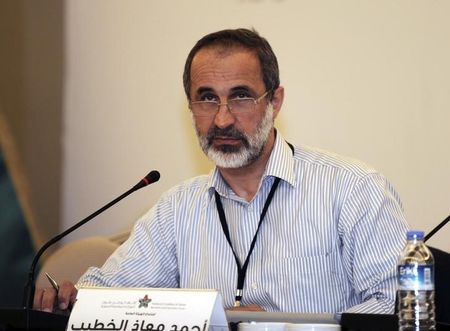BEIRUT (Reuters) - The former head of Syria's main political opposition said he had visited Russia with other opposition figures and had discussed ways to end the conflict with Damascus's ally Moscow, but had insisted that President Bashar al-Assad must go.
Moaz Alkhatib, the former head of the National Coalition for Syrian Revolutionary and Opposition Forces, said on Twitter on Saturday that they had met Russian Foreign Minister Sergei Lavrov and other Russian officials.
"At the invitation of Russia, Syrian opposition figures and I visited and talked about a political solution and its mechanisms," he wrote in a tweet.
"We mentioned to the Russians that our country cannot heal while the head of the regime, who is the No.1 responsible for bloodshed and devastation, remains. We cannot accept his role in the future of Syria," he wrote in a second tweet.
Although he no longer leads the main opposition in exile, Alkhatib is a respected figure seen by diplomats as someone who could play a part in a future political solution for Syria, where the conflict is in its fourth year.
Attempts to reach Alkhatib were unsuccessful and the Russian Foreign Ministry was not immediately available for comment.
Lebanese media reported on Saturday that Walid Jumblatt, the leader of Lebanon's minority Druze community and head of the Progressive Socialist Party, was also at the meeting, which took place late last week. Jumblatt wrote on Twitter that he was in Moscow and posted photos of his trip.
Jumblatt has also called for Assad to step down in order for Syria to reach a solution to the civil war, which has occasionally spilled over into its smaller neighbour Lebanon and stirred communal and political tensions.
Details on the Moscow meeting come at the same time as the start of a visit by the United Nations Syria mediator Staffan de Mistura to Damascus on Saturday.
Syrian media have said he will meet government officials to discuss ideas on implementing local ceasefire agreements. De Mistura visited Moscow last month.
Russia and Iran are Assad's most powerful international allies. In August, Lavrov urged Western and Arab governments to overcome their distaste for the Syrian president and to engage with him to fight Islamic State insurgents.
Alkhatib, a former imam of the Umayyad Mosque in Damascus, stepped down in March 2013 after only four months at the head of the coalition, which is backed by Western and Gulf states.
His resignation came after the coalition berated him for offering Assad a negotiated exit and after the group went ahead with steps to form a provisional government that would have further diminished his authority.

The opposition coalition has little influence over insurgents fighting to overthrow Assad in a conflict that has been complicated by the success of rival hardline Islamist groups.
(Reporting by Sylvia Westall; Editing by Dominic Evans and Stephen Powell)
